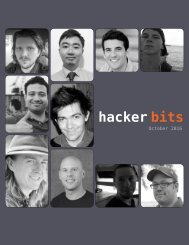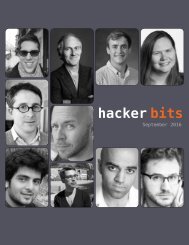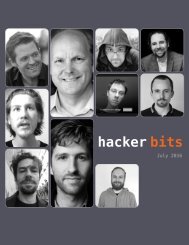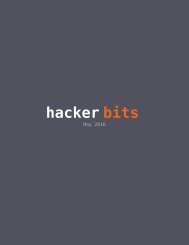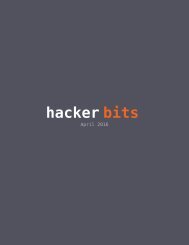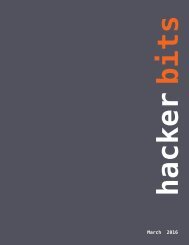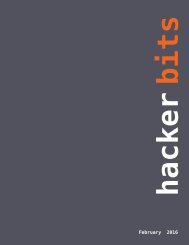Hacker Bits, August 2016
HACKER BITS is the monthly magazine that gives you the hottest technology stories crowdsourced by the readers of Hacker News. We select from the top voted stories and publish them in an easy-to-read magazine format. Get HACKER BITS delivered to your inbox every month! For more, visit https://hackerbits.com/2016-08.
HACKER BITS is the monthly magazine that gives you the hottest technology stories crowdsourced by the readers of Hacker News. We select from the top voted stories and publish them in an easy-to-read magazine format.
Get HACKER BITS delivered to your inbox every month! For more, visit https://hackerbits.com/2016-08.
You also want an ePaper? Increase the reach of your titles
YUMPU automatically turns print PDFs into web optimized ePapers that Google loves.
Imagine yourself starting,<br />
not finishing.<br />
Cleaning the flat, working<br />
out, reaching inbox zero:<br />
these are all worthy goals,<br />
yet sometimes getting stuck in<br />
the infernal hackersnews ∞ reddit<br />
loop seems so much more...<br />
relaxing.<br />
Let’s begin by delving into<br />
the physiology of procrastination:<br />
“[procrastination is] a<br />
battle of the limbic system,<br />
the unconscious zone that<br />
includes the pleasure center,<br />
and the prefrontal cortex,<br />
the internal planner.<br />
When the limbic system<br />
dominates, which is pretty<br />
often, the result is putting<br />
off until tomorrow what<br />
could, and should, be done<br />
today.”<br />
Source: scienceabc.com<br />
So how can we trick our<br />
limbic system to not “dominate”?<br />
The answer resides in how<br />
we picture the task. When we<br />
picture a task, we often imagine<br />
completing the task, if such<br />
a thing is even possible, and are<br />
also aware of task inter-relatedness.<br />
Therein lies the problem.<br />
This is what Neil Fiore has<br />
to say about it in his book: The<br />
Now Habit.<br />
“The task before you is to<br />
walk a solid board that is<br />
thirty feet long, four inches<br />
thick, and one foot wide.<br />
You have all the physical,<br />
mental, and emotional<br />
abilities necessary to<br />
perform this task. You can<br />
carefully place one foot in<br />
front of the other, or you<br />
can dance, skip, or leap<br />
across the board. You can<br />
do it. No problem.”<br />
This is how non-procrastinators<br />
visualise a task. However,<br />
Situation B is how procrastinators<br />
visualise the same task.<br />
“Now imagine that the task<br />
is just the same, to walk a<br />
board thirty feet long and<br />
one foot wide, and you<br />
have the same abilities;<br />
only now the board is suspended<br />
between two buildings<br />
100 feet above the<br />
pavement. Look across to<br />
the other end of the board<br />
and contemplate beginning<br />
your assignment. What<br />
do you feel? What are you<br />
thinking about? What are<br />
you saying to yourself?”<br />
The task is more or less the<br />
same; however the mental representation<br />
is entirely different.<br />
Imagine yourself<br />
starting, not finishing<br />
What is the first, smallest,<br />
shortest, and least effortful task<br />
you can perform to get started?<br />
Say you need to clean your flat:<br />
then it could be to:<br />
take 1 plate and put it in<br />
the sink.<br />
That simple act has now<br />
set you in motion. In other<br />
words: the prefrontal cortex has<br />
won.<br />
Why does this work?<br />
It works because your limbic<br />
system is now experiencing the<br />
previously terrifying task, but is<br />
no longer feeling terrified by it.<br />
This enables you to build new,<br />
fresh memories of what was<br />
previously uncomfortable to the<br />
point of procrastination, but<br />
now feels perfectly fine and safe.<br />
tldr: imagine yourself starting,<br />
not finishing. •<br />
Reprinted with permission of the original author. First appeared at shyal.com/blog.<br />
hacker bits<br />
63








